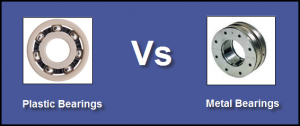10 Reasons Why Plastic Bearings Outperform Metal
Traditionally plastic was considered to be an unreliable weak material. But today, given the technological leaps taken by humankind, we are capable of providing reinforced plastic solutions that are stronger than metal. Plastic bearings, for example can be used to provide strength and reliability without the excessive weight.
Reasons Why Plastic Bearings Outperform Metal
Plastic is the new age material that should be embraced by all industries. From construction to medical, the possibilities are endless. Here are five reasons you should integrate plastic solutions:
1. Strength
Plastic bearings feature unparalleled mechanical properties. They are much stronger than metal, and can be used in various applications. With high resilience to environmental factors and abrasive chemicals, the functioning of plastic fasteners is unaffected in adverse conditions. This ensures that the strength exhibited by the product remains unaffected.
2. Self-lubricating
The lubricants form part of the fasteners’ material. Hence, the plastic fasteners are self-lubricating. The lubricants are present in solid form. At the onset, a part of the material is worn off, and gets lodged in the mechanism. As the mechanism functions, the material melts and provides lubrication. This entire process occurs without any major physical change of the fastener. Hence, the reliability or functioning of the fastener is unaffected. This helps increase the life of the application and improves productivity. Any damage related to dry start-ups will be avoided with self-lubricating plastic fasteners.
3. Lightweight
Plastic is much lighter than metal. Other than the overall weight, the walls of the plastic fasteners are thinner compared to those made of metal. This further helps reduce the overall weight of the fastener.
4. Eco-friendly
Plastic fasteners are used in applications for their strength, self-lubrication, and lower weight among others. All these factors make plastic fasteners eco-friendly. Here’s how:
- Strength: Since, plastic fasteners provide the same results, if not better, than their metal counterparts, they are the preferred option. Unlike metal fasteners, plastic components don’t require any harmful additives or coatings to support their functioning. This makes them eco-friendly as well as useful in application.
- Self-lubrication: The solid lubricators and the material of plastic fasteners have decreased the use of lubricants by almost 80% per fastener. This directly has an effect on the eco-friendliness of the product. With lower consumption of lubricants, there is less wastage and lower production of lubricants.
- Lightweight: The weight of a component has a direct effect on the power consumption of an application.
5. Maintenance-free
These products are self-lubricating, corrosion-free, and are not affected by extreme temperatures. This is enough validation of the fact that they are low in maintenance. Plastic fasteners are also wear resistant making them virtually maintenance free.
6. Economical
Products developed using plastic resins are available in a wide price range. You can benefit from the use of plastic fasteners without paying exorbitant prices by choosing the right type of plastic fastener. A low-cost plastic fastener will provide almost all the benefits enlisted here.
7. Corrosion Resistant
Plastic resins are unaffected by moisture and water. They can be used in such environments without any change to their physical properties. When metal fasteners corrode, their strength is affected as well. They slowly wear out and could result in damaging the equipment used in conjunction with the fastener.
8. Abrasion Resistant
Plastic fasteners are resistant to most chemicals as well. These chemicals include those used in regular industrial cleaning as well as those used in applications for transport, or other specific needs.
9. Longer Service Lives
Plastic does not wear easily. This makes it last longer than metal fasteners. With longer service lives, plastic fasteners prove to be the more economical choice.
10. Thermal Properties
Most plastic resins can be used in temperatures as high as 500 ºF and as low as -40 ºF. This makes them extremely useful in varied applications. Their walls can easily dissipate heat. This makes the application function at a lower temperature, which increases productivity.
Several material options are available for plastic fasteners. You can choose a material that meets all your application requirements. Plastic is the preferred choice for most applications and industries where weight, corrosion, heat, and regular maintenance can be a problem. Plastic fasteners offer several advantages over metal fasteners. These factors should be correlated to the needs of your application helping you get the most out of your components, and driving productivity.

